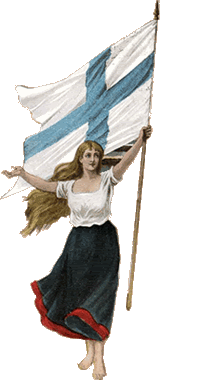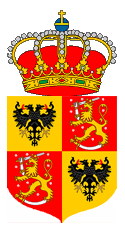Hugoland

| |
| Flag of Hugoland | |
| Motto: Ipsa qvidem pretivm virtvs sibi | |
| No Map Available Yet | |
| Region | Europe |
|---|---|
| Capital | Sophiapolis, SP |
| Official Language(s) | English, Latin |
| Leader | Rex (King) BONIFACIUS I (Head of state)
Chancellarius (Chancellor)Martelo Rebelo DE SOUSA(Head of government) |
| Population | 431 million (10% rule) |
| Currency | Denarius |
| NS Sunset XML | |
Contents
General facts

]
The Federal Monarchy of Hugoland, in english, is the great powerhouse of the European Nordic nations. Hugoland is different from other Nordic nations, as the Hugolandians speak English and Latin, due to the influence of merchants from Azores Islands, the largest Hugolandian trade partner since the XI century.
Hugoland is a Federation of 10 States, lead by the Officium Chancellari (Chancellery Office), which has been controlled by the Hugolandian National Union with a large majority in the Senatus (Senate). Although the Federation is, in theory, a Monarchy, the Regina has no power.
The capital city of the Federation is Sophiapolis. This city, home to 20 million people, is also home for the Chancellari Palatium (Chancellery Palace)and the Regia (Royal Palace).
Economically the country is lead by free trade policies. The contry is open to foreign investment, specially in the areas of tourism. The Federal State has a social network side by side with private pension systems, which are quite popular in Hugoland. The Chancellari tries to keep low taxes policies, while the main industries of the country are the Automobile Manufacturing, Weapons Production and Leisure time services (Tourism, Discotheques, etc.).
Administrative order
Federal Capital
</div>As said above, the Federal Capital is Sophiapolis, host city of all the executive, legislative and judisdiction bodies.
Sophiapolis is also the State Capital of the Sophiapolis State.
States
State (Capital) Baccalaureu (Lago da Beata), Boscoburgo (Boscoburgo), Centru (Centru), Cognoscere (Cognoscerepolis), Domingos Sávio (Porto Sávio), Navigiu (Docas Secas), Nive (Nivepolis), Pixeburgo (Pixeburgo), Saphira (Shohre), Sophiapolis (Sophiapolis).
The States are governed by state governments, which are not elected, but appointed by the Hugolandian Federal Cancellarius, which means the Federation is nothing more than theory, since every important decision is decided in Sophiapolis, as the states do not have local parliaments.
International Affilitation
Alliance of Monarchist European States, European Union, Kalmar Union, Kalmar's United Defence Initiative, Red Cross, Stuttgart Treaty.
Overseas possessions
None
Federal Symbols
Hugolandian Federal Civil Flag
</div>The Hugolandian Civil Flag is an emblem flown as a symbol of the Hugolandian nationality. Proudly used by the Hugolandian citizens to represent the Hugolandian Federal Monarchy. It is a tradition to every Hugolandian family to have this flag hoisted at their homes.
Hugolandian Federal State Flag
</div>The Hugolandian Federal State flag is the flag flown by the members of the Officium Chancellari or other important members of the Hugolandian state, distinguished from the civil flag, used by the citizenry, and from military flags.
Hugolandian National Anthem
The Hugolandian National Anthem was very recently introduced. The current anthem, God Save Bonifacius, was written in honour of His Majesty the King Augustus Bonifacius.
God Save Bonifacius
God Save Bonifacius
Long live noble Bonifacius,
God save Bonifacius!
Send Bonifacius victorious,
Happy and glorious,
Long to reign over us;
God save Bonifacius!
O Bonifacius our King arise,
Scatter our enemies
And make them fall;
Confound their politics,
Frustrate their knavish tricks,
On thee our hopes we fix,
Bonifacius save us all!
The Federal Regime
The Federal Monarchy of Hugoland is a democratic monarchist Federation. The King is only cerimonial institution, while the Officium Chancellari and the Senatus hold all the power.
Rex
</div>His Majesty Augustus Bonifacius Ambrosius Aurelianus Antontus Pius Di Pinto et Magnificus Rex Hugolandianus, dux, rex, tyrannus, et basileus Mare Nostrum Patrium, or simply Bonifacius I of Hugoland, is the King of Hugoland and legitimate heir to the throne of the Empire of the Azores and the Northern Sea.
The Royal Family
</div>The House of Mercoburg et di Pinto is the Hugolandian Royal Family since 2005 when HM Augustus Bonifacius was found to be the legitimate heir to the throne.
Its current titles are:
Emperor of the Azores and the Northern Sea, King of Hugoland, Grand Duke of Aljubarrota, Duke of Mercoburg and Borgonha, Count of Monteblanco, São Pedro, Ponta do Sol, São Roque, Senhora das Mercês and Cornualha
Officium Chancellari
See the complete article at: Officium Chancellari
Chancellarius
</div>Senatore Martelo Rebelo DE SOUSA (NHU) is the current Chancellarius, who was elected in March 2005. He chosen the former Prime-Minister, the Senatore João Gonçalves, to the office of Vice Chancellarius.
The cabinet
The Cabinet of the Officium Chancellari is composed by the Chancellarius, a Vice-Chancellarius (the Vice Chancellarius is also the responsible for the Foreign Affairs office) and 8 Ministrus (Ministers). They have the responsability of leading and representing the country, and all of them are also Senatores, so, they must be able to defend their policies in the Senatus. The current Cabinet is supported by the National Hugolandian Union
Chancellarius - Senatore De Sousa
Vice-Chancellarius - Senatore João Gonçalves
Ministru for Economic Affairs - Senatore Pedro FURADO
Ministru for National Defense - Senatore Esteves CRUZ
Ministru for Internal Affairs - Senatore Guedes MENDONÇA
Ministru for Education, Culture, Youth and Sports - Senatore Rui UÍSQUE
Ministru for Social Issues and Health - Senatore José RELVA
Ministru for Infrastructure, Science and Tecnology - Senatore Raúl BORGES
Ministru for Environmental Issues - Senatore Manuel FRANGO
Executive Cronology
Before 1965 the Head of State was also Head of Government, having absolute power. Then, in 1965, Hugoland became a Constitutional Monarchy.
Government of the Kingdom of Hugoland
1965-1994 - Prime Minister BRUNO Tomás OLIVEIRA
1994-2002 - Prime Minister SANTANA Flopes ELMANDER
2002-2005 - Prime-Minister JOÃO Miguel Koeman GONÇALVES
Officium Chancelleri of the Federal Monarchy of Hugoland
Since 2005
- Chancellarius Martelo Rebelo DE SOUSA
- Vice Chancellarius JOÃO Miguel Koeman GONÇALVES
Chancelleri Agencies
Those are the Agencies under direct control and responsability of the Officium Chancellari. All the important reports of those Agencies must be read and approved to the Officium Chancellari. The Directors of those Agencies are nominated by the Chancellarius.
Security Intelligence Services (SIS)
The SIS are the Intelligence Agency of the Officium Chancelleri, they are responsable for monitoring the situation of the Federation. They have full power on all the Hugolandian States and on Hugolandian Embassies on foreign countries.
Royal Hugolandian Space Agency (RHSA)
The Royal Hugolandian Space Agency is an agency partially controlled by the Hugolandian State commited to the research and exploration of Space. The Agency was founded very recently in 2005 by the initiative of the Chancellarius De Sousa.
Program for the Increase of Private Investment (PIPI)
The PIPI is seen as essential to the Hugolandian Economy. Their work consists in helping small and medium companies with a range of services. The PIPI also helps Hugolandian enterprises interested in expanding to other European countries. Last but not lead, the PIPI has been extremely sucessful atracting foreign investment, essential to the Hugolandian Economy.
The PIPI is known for helping creating and advising the McBonifacius Corporation.
Tourism Investiment Program (TIP)
This program is seen as the latest effort of the Officium Chancellari to promote Hugoland. The TIP helps citizens who want to create their own business related to Tourism. This program plays also a very important role in the coordenation of the National Tourism Policy.
Hugoland is expected to become the number one winter tourism destination in Europe in few years.
Senatus
</div>The Hugolandian Senatus has only one chamber. It is the great decision place, where the Senatores, elected in direct elections by the population. It has the power to elect the Chancellarius, who forms his cabinet, the Officium Chancellari, that must be composed by members members of the Senate (the Senatores). The Chancellarius and his cabinet must be Senatores, and they continue to be Senatures with full rights.
Any Senatore can propose a bill, that needs the approval of the majority of the legislature. War, Peace and other international treaties must be approved by 2/3s of the legislature.
Senatus Hugolandianus (75 Members); directly elected every four years.
Parties: National Hugolandian Union (56), Social-Democratic Party (19)
The I Senatus Hugolandianus
The Praesidente (President) of the Senatus is HE João Dias Almeida. The Praesidente is appointed by the Monarch.
NHU - 56 Seats (last result 53.6%)
SDP - 19 Seats (last result 17.8%)
Tribunal Supremu
</div>
The Tribunal Supremo (Supreme Court) is the highest court in the judicial branch of the Federal Monarchy of Hugoland. It consists of a five high-skilled Judices (Judges). The Supreme Court is the "court of last resort" for appeals-the final authority on any questions dealing with the Federal Law and acts of the Senatus. If a case is decided by the Hugolandian Tribunal Supremu, it cannot be appealed.
Economy

]
Hugoland has a highly industrialized,free-market economy, with a high per capita output. Its key economic sector is manufacturing - principally automobile and weapons. The Touristic activity related to the leisure sector is also essential to the Hugolandian Economy, as Hugoland excels in alcoholic drinks production, bars, discotheques and Ski resorts. Hugoland has acheived energetic independence due to the widespread use of Nuclear Power Plants and hidrogen-powered vehicles. Because of the climate, agricultural development is limited to producing alcoholic drinks.
Top 10 Trade Partners
Largest Industries
Automobile Manufacturing
Leisure
Arms Manufacturing
Spiritis Production
Retail
Most Important Corporations
HLDS Incorporated
Population
Overview
The population of the Federal Monarchy of Hugoland is 431 million and growing fast. The Hugolandian population is nordic, with many Azorean traces, due to the contact with Azorean merchants, who had an huge influence in ancient Hugoland, and due to todays Azorean influence.
The Hugolandian population ethnicity can be divided in: Original Hugolandians (64%), Azorean Hugolandians (31%), 5% Other Hugolandians.
Language
The official languages in Hugoland are English and Latin. English is the dominant language, while Latin is used mainly on politics and law. English was adopted in 1330 to replace Hugolandian, the original Nordic language, as English was better to establish trade. In 1330 Hugoland was fully dependent of trade and of the sea, and all it's cities were located in the coast.
Latin was brought by the Azorians, who sucessfully established business in the city of Tructa (Sophiapolis nowadays). After a growing influence, specially in the coastline area, Latin was declared an offical language in 1625.
There are also non-official langages spoken in Hugoland. The most important is the Azorean, frequently used by the large Azorean community and very common in the Boscoburgo State. There are other less spoken languages like Arnen and other nordic languages.
Foreign Communities
The first Foreign Community in Hugoland was made of merchants from Azores Islands that settled in the coastal cities, specially Sophiapolis and Pixeburgo in the 14th century. But has the years passed, this Community was fully integrated and, thus, disappeared.
In 1991 a new horde of Azorean immigrants arrived. Thousands of supporters of HM Augustus Bonifacius (deposed as Azorean President in 1991) and Bonifacius himself came to Hugoland under the protection of the Hugolandian Government. This Azorean elite settled in Boscoburgo, which recently had an huge development.
Hugoland has also some tiny foreign communities, mainly from other Nordic nations.
Royal Hugolandian Armed Forces
Branches and Command
Five Star General António CARMONA is the Commander of the Hugolandian Armed Forces, he is appointed by the King and by the Officium Chancellari.
The RHAF is divided in 4 branches: Air Force, Army, Royal Guard, and Navy.
All the members of the RHAF are profissional.
Army
Headquarters: Sophiapolis Military Castle
Commander: General Rudolph Petersson
Men: 1.940.721
Air Force
Headquarters: Military Aiport Afonso III
Commander: General Fernando TRILHO
Men: 66.931
Headquarters: Sophiapolis Harbour "C"
Commander: Admiral Jorge FONSECA
Men: 336.881
Royal Guard
Headquarters: Flores Square Palace, Sophiapolis
Commander: Brigadier General Daniel BARROS
Men: 2.212.000






